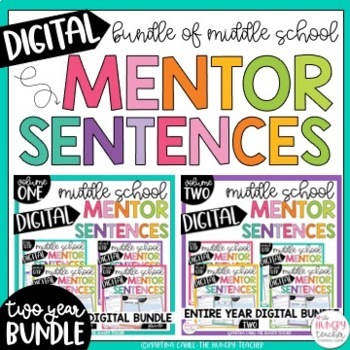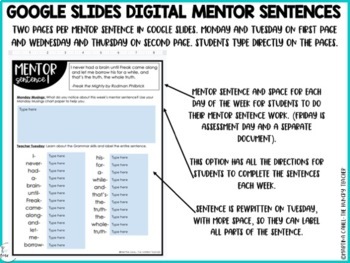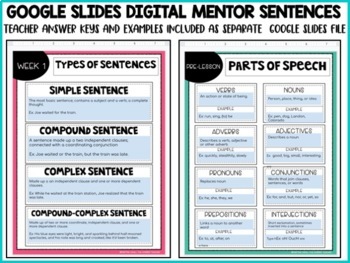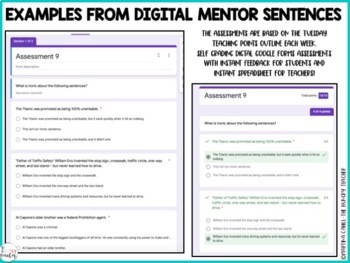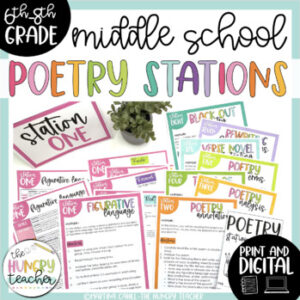Description
Download a preview <<HERE>>
-
Google Slides Interactive Mentor Sentences for students to type into.
-
Google Slides Interactive Tuesday Grammar Lesson note pages for students to type right into
-
Google Forms SELF-GRADING Friday Assessments
-
Google Slides Mentor Sentences to Display
-
Google Slides Mentor Sentences Answer Keys for Teachers
-
Google Slides Tuesday Lesson Examples and Answers for Teachers.
-
Student grammar, parts of speech, punctuation, etc. reference sheets (8 reference pages in all). Color and black and white options. (PDF)
-
Call of the Wild by Jack London
-
Freak the Mighty by Rodman Philbrick
-
HP Book One by J.K. Rowling
-
Percy Jackson and the Lightning Thief by Rick Riordan
-
The Absolute True Diary of a Part-Time Indian by Sherman Alexie
-
The Fault in our Stars by John Green
-
The Hunger Games by Suzanne Collins
-
The Maze Runner by James Dashner
-
The Outsiders by S.E. Hinton
-
A Separate Peace by John Knowles
-
All American Boys by Jason Reynolds
-
Divergent by Veronica Roth
-
Noggin by John Corey Whaley
-
The Bad Beginning by Lemony Snicket
-
The Giver by Lois Lowry
-
The Hate U Give by Angie Thomas
-
To Kill a Mockingbird by Harper Lee
-
White Fang by Jack London
-
A Wrinkle in Time by Madeleine L’Engle
-
Everything Everything by Nicola Yoon
-
Matched by Ally Condie
-
Me, Earl and the Dying Girl by Jesse Andrews
-
Middle School- The Worst Years of My Life by James Patterson
-
Miss Peregrine’s Home for Peculiar Children by Ransom Riggs
-
Schooled by Gordon Korman
-
The Hobbit by J.R.R Tolkien
-
Thirteen Reasons Why by Jay Asher
-
Booked by Kwame Alexander
-
Miss Peregrine’s Home for Peculiar Children by Ransom Riggs
-
Orbiting Jupiter by Gary Schmidt
-
Red Queen by Victoria Aveyard
-
Simon vs. the Homo Sapiens Agenda
-
The Book Thief by Markus Zusak
-
The Crossover by Kwame Alexander
-
The Perks of Being a Wallflower by Stephen Chbosky
-
Where the Mountain Meets the Moon by Grace Lin
-
Parts of Speech
-
Simple Sentences, Complex, Compound, and Compound-Complex
-
Independent and Dependent Clauses
-
Figurative Language: Hyperboles
-
Types of Phrases: Absolute, Appositive, Gerund, Infinite, Noun, Participle, and Prepositional
-
Colons and Semicolons
-
Types of Pronouns: Possessive, Reflexive, Reciprocal, Demonstrative, Interrogative, and Indefinite
-
Subordinating and Coordinating Conjunctions
-
Using Quotation Marks Correctly
-
Verb Moods: Indicative, Imperative, Interrogative, Conditional, and Subjunctive
-
Figurative Language: Personification
-
Common Prefixes and their Meanings
-
Using Context Clues to determine word meanings
-
Connotation and Denotation
-
Verbs: Infinitive, Present Participle, Past Participle, and Past Tense
-
Common and Proper Nouns
-
Common Homophones
-
Intensive and Vague Pronouns
-
Direct and Indirect Objects
-
Object of the Preposition
-
Figurative Language: Metaphor and Simile
-
Punctuation Nonrestrictive Elements
-
Author Style and Tone
-
Comparative and Superlative Adjectives
-
Benefits of using the four different types of sentence structure (variety)
-
Proper Noun Rules
-
Dangling Modifier Rules
-
Expressing Ideas Precisely and eliminating wordiness and redundancy
-
Plural Noun Rules
-
Verbals, Gerunds, and Infinitives
-
Past and Present Participle
-
Abstract Nouns
-
Concrete Nouns
-
Punctuating and Capitalizing Titles of Works
-
Subjects and Predicates
-
Simple Subjects and Predicates
-
Compound Subjects and Predicates
-
Verb Tenses (12 Different Verb Tenses)
-
Verbs: Action, Helping, and Linking
-
Figurative Language: Allusion
-
Rules for Using Numbers in English
-
Rules for Using Apostrophes in English
-
Rules for Using Commas in English
-
Prepositions and Prepositional Phrases
-
Direct and Indirect Objects
-
Object of the Preposition
-
Commonly Confused Words
-
Irony: Situational, Dramatic, and Verbal
-
Active and Passive Verbs
-
Sentences: Imperative, Exclamatory, Interrogative, and Declarative
-
Adjectives: Descriptive, Quantitative, Demonstrative, Possessive, Distributive, Interrogative, and Articles
-
Antonyms and Synonyms
-
Figurative Language: Idioms
-
Differences between Who and Whom
-
Al Capone Does My Shirts by Gennifer Choldenko
-
Drums, Girls, and Dangerous Pie by Jordan Sonnenblick
-
HP Book Three by J.K. Rowling
-
Prisoner B-3087 by Alan Gratz
-
Ready Player One by Ernest Cline
-
The Selection by Kiera Cass
-
They Both Die at the End by Adam Silvera
-
Turtles All the Way Down by John Green
-
Ungifted by Gordon Korman
-
All the Bright Places by Jennifer Niven
-
Refugee by Alan Gratz
-
The Summer I Turned Pretty by Jenny Han
-
Five Feet Apart by Rachael Lippincott
-
It’s Kind of a Funny Story by Ned Vizzini
-
Unwind by Neal Shusterman
-
Counting by 7s by Holly Goldberg Sloan
-
Dumplin’ by Julie Murphy
-
Dear Evan Hansen by Val Emmich
-
The Remarkable Journey of Coyote Sunrise by Dan Gemeinhart
-
Restart by Gordan Korman
-
The Girl Who Was Supposed to Die by April Henry
-
Ghost Boys by Jewell Parker Rhodes
-
An Elephant in the Garden by Michael Morpurgo
-
Long Way Down by Jason Reynolds
-
The Boy on the Wooden Box by Leon Leyson
-
Insignificant Events in the Life of a Cactus by Dusti Bowling
-
House Arrest by K.A. Holt
-
Swing by Kwame Alexander
-
Anne Frank: Diary of a Young Girl by Anne Frank
-
Maniac McGee by Jerry Spinelli
-
Bomb: The Race to Build and Steal… by Steve Sheinkin
-
Brown Girl Dreaming by Jaqueline Woodson
-
Two Can Keep a Secret by Karen M. McManus
-
The Night Diary by Veera Hiranandani
-
Anne Frank: Diary of a Young Girl by Anne Frank
-
When Dimple Met Rishi by Sandhya Menon
-
Parts of Speech
-
Sentences: Simple, Complex, Compound, and Compound-Complex
-
Sentences: Imperative, Declarative, Interrogative, and Exclamatory
-
Independent and Dependent Clauses
-
Simple and Complete Subjects and Simple and Complete Predicates
-
Phrases: Appositive, Gerund, Infinitive, Noun, Participle, Prepositional, and Absolute
-
Verbs: Action, Helping, Linking
-
Verbs Tenses: Present Tense, Past Tense, Future Tense
-
Verb Moods: Indicative, Imperative, Interrogative, Conditional, and Subjunctive
-
Common, Proper, and Plural Nouns
-
Figurative Language: Similes and Personification
-
Concrete and Abstract Nouns
-
Vague Pronouns
-
Proper Nouns
-
The Different Types of Pronouns
-
Figurative Language: Hyperboles, Metaphors, and Allusions
-
Active and Passive Verbs
-
The Different Types of Adjectives: Descriptive, Quantitative, Possessive, Demonstrative, Interrogative, Distributive, Predicate, Noun Modifier (Determiner), Comparative, and Superlative
-
Dangling Modifiers
-
Expressing Ideas Precisely and Without Redundancy
-
Coordinating and Subordinating Conjunctions
-
Prepositions
-
Prepositional Phrases
-
Object of the Preposition
-
Indirect and Direct Objects
-
Quotation Mark Rules
-
Determining the Meanings of Unknown Words
-
Using Dashes
-
Using Commas
-
Capitalization Rules
-
Colons
-
Semi-Colons
-
Punctuating Non-Restrictive Elements
-
Figurative Language: Idioms and Alliteration
-
Verbals
-
Using apostrophes
-
Using numbers In English
-
Using words and context clues to determine their meanings.
-
Homophones
-
Using commas
-
Connotation and denotation
-
The Three Types of Irony
-
Who vs. whom
-
Volume One Digital and Print Middle School Mentor Sentences
-
Volume Two Digital and Print Middle School Mentor Sentences
-
Middle School Mentor Sentences Volume 1: Two Free Weeks
-
Middle School Mentor Sentences Volume 2: Two Free Weeks
